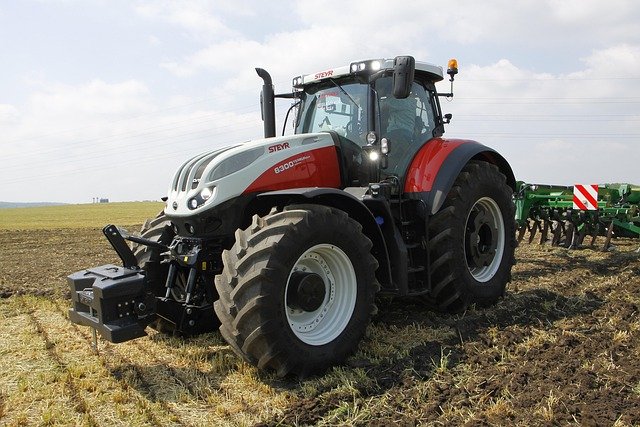Understanding Second-Hand Tractors for Agricultural Use
Purchasing a used tractor can be a practical decision for farmers and agricultural professionals looking to expand their operations without the significant investment required for new equipment. Second-hand tractors offer functionality and reliability at a fraction of the cost, making them an attractive option for small to mid-sized farms. However, buying used machinery requires careful consideration of various factors to ensure you make a sound investment that meets your farming needs.

Second-Hand Tractor Options for Farming and Agricultural Use
The market for used tractors is diverse, offering a wide range of models from various manufacturers. Farmers can choose from compact utility tractors suitable for small-scale operations, mid-range models for general farm work, or larger tractors designed for heavy-duty tasks. Popular brands in the second-hand market include John Deere, Massey Ferguson, Kubota, New Holland, and Case IH. These manufacturers have established reputations for durability, which means their tractors often maintain functionality even after years of use.
When exploring second-hand options, consider the age of the tractor, its operational history, and the availability of replacement parts. Older models may be more affordable but could present challenges in sourcing components. Conversely, newer used tractors typically command higher prices but offer modern features and better fuel efficiency. Online marketplaces, local dealerships, farm auctions, and agricultural equipment retailers are common sources for finding used tractors.
Key Factors to Consider When Buying a Used Tractor
Several critical factors should guide your decision when purchasing a used tractor. First, assess the tractor’s overall condition by examining the engine hours, which indicate how extensively the machine has been used. Lower hours generally suggest less wear, though proper maintenance matters more than hours alone. Second, verify the tractor’s maintenance history through service records, which can reveal whether the previous owner performed regular upkeep.
The tractor’s intended use on your farm is another essential consideration. Match the machine’s capabilities to your specific tasks, whether plowing, tilling, hauling, or operating attachments. Additionally, consider the availability of local service and parts support for the brand and model you’re considering. Tractors from well-established manufacturers typically have better parts availability and more accessible repair services.
Inspection and Maintenance Tips Before Purchasing
Before finalizing a purchase, conduct a thorough inspection of the used tractor. Start with a visual examination, looking for signs of rust, leaks, or structural damage to the frame and body. Check the tires for adequate tread and even wear patterns. Inspect hydraulic systems for leaks or weak performance, as hydraulic repairs can be costly.
Test the engine by listening for unusual noises, checking for excessive smoke, and observing how smoothly it starts and runs. Examine the transmission by testing all gears and ensuring smooth shifting without grinding or slipping. The power take-off (PTO) should engage and disengage properly without hesitation. If possible, operate the tractor under load conditions similar to what you’ll encounter on your farm.
Consider hiring a qualified mechanic to perform a pre-purchase inspection, especially for higher-value tractors. This professional assessment can identify hidden issues that might not be apparent during a casual inspection. Request all available maintenance records and ask the seller about any known problems or recent repairs.
Comparing Horsepower and Attachments for Different Farming Needs
Horsepower requirements vary significantly based on farming operations. Small farms with light-duty tasks such as mowing, landscaping, or operating small implements typically need tractors in the 20-40 horsepower range. Medium-sized operations requiring plowing, tilling, and moderate hauling generally benefit from 40-80 horsepower tractors. Large-scale farming operations with heavy implements and extensive acreage often require tractors exceeding 100 horsepower.
Attachment compatibility is equally important when selecting a used tractor. Common attachments include front-end loaders, backhoes, rotary tillers, mowers, plows, and post-hole diggers. Verify that the tractor has the appropriate hitch types, hydraulic connections, and PTO specifications for your intended attachments. Some tractors offer three-point hitch systems with different categories (Category 1, 2, or 3), each designed for implements of varying sizes and weights.
Pricing Trends and Resale Value of Used Tractors
Understanding pricing trends helps farmers make informed purchasing decisions. Used tractor prices depend on factors including age, condition, brand reputation, horsepower, and market demand. Generally, compact tractors in good condition with 20-40 horsepower range from $8,000 to $20,000. Mid-range tractors with 40-80 horsepower typically cost between $15,000 and $45,000, while larger tractors exceeding 100 horsepower can range from $40,000 to over $100,000, depending on age and features.
| Tractor Type | Horsepower Range | Typical Price Range | Common Brands |
|---|---|---|---|
| Compact Utility | 20-40 HP | $8,000 - $20,000 | Kubota, John Deere, Mahindra |
| Mid-Range | 40-80 HP | $15,000 - $45,000 | Massey Ferguson, New Holland, Case IH |
| Large Agricultural | 100+ HP | $40,000 - $100,000+ | John Deere, Case IH, New Holland |
| Specialty/Vintage | Varies | $3,000 - $30,000 | Ford, International Harvester, Allis-Chalmers |
Prices, rates, or cost estimates mentioned in this article are based on the latest available information but may change over time. Independent research is advised before making financial decisions.
Resale value considerations are important for long-term financial planning. Tractors from reputable brands with strong dealer networks tend to retain value better than lesser-known manufacturers. Well-maintained tractors with documented service histories command premium prices in the resale market. Seasonal fluctuations also affect pricing, with demand typically increasing during spring planting season and decreasing during winter months.
Making an Informed Purchase Decision
Purchasing a used tractor requires balancing immediate needs with long-term value. Take time to research different models, compare prices across multiple sellers, and thoroughly inspect any tractor before committing. Consider the total cost of ownership, including potential repairs, maintenance, fuel consumption, and insurance. Negotiate based on the tractor’s condition and any issues discovered during inspection. With careful evaluation and proper due diligence, a second-hand tractor can provide years of reliable service while offering significant cost savings compared to purchasing new equipment.




